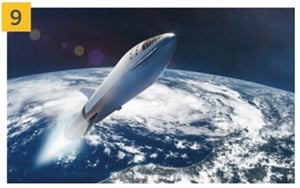With the pandemic having caused widespread changes in most areas of life and business, the world is left questioning what’s to come and what the lasting effects of the coronavirus may be.
In the latest edition of The World Ahead, formerly The World In, published by The Economist to prepare readers for what to expect in the short term, 10 themes and trends are defined. These include the impending “end” of the pandemic, labor force concerns, cryptocurrency, the rise in tech and the shaky travel industry. Here’s more about them in brief, as outlined by Tom Standage, editor of The World Ahead 2022.

Democracy versos autocracy. Strong and persisting contrasts between the American and Chinese governments will intensify, proposing questions about which country is better positioned to deliver “stability, growth and innovation.” The impact will be felt everywhere, including tech and trade regulation, vaccinations and even space stations.
––––––––––––––––––––––––––––––––––––––––––––––––––––––––––––––––

––––––––––––––––––––––––––––––––––––––––––––––––––––––––––––––––

Inflation worries. Disturbances in the supply chain, like the shipping container shortages have caused prices to surge, is something not everyone believes is temporary. Britain is particularly at risk of stagflation due to labor shortages and dependence on expensive natural gas.
––––––––––––––––––––––––––––––––––––––––––––––––––––––––––––––––

The future of work. There is an understanding that the future of the workforce is and will continue to be a hybridization of in-office and remote work. However, there isn’t a clear-cut idea of what’s fair, appropriate and acceptable, which includes debate over tax procedures and the monitoring of remote workers.
––––––––––––––––––––––––––––––––––––––––––––––––––––––––––––––––

The new techlash. China is leading the way in tech, and as a result it’s now pressuring tech firms to focus on “deep tech,” which is tech that is not focused on end-user technologies but on finding solutions to scientific or engineering problems. The question here is whether coercing tech companies to stop focusing on services that entail AI, blockchain or robotics will suppress the tech industry’s innovation.
––––––––––––––––––––––––––––––––––––––––––––––––––––––––––––––––

Crypto grows up. Cryptocurrency is a new technology, but it’s been around long enough now that regulations have been created and are tightening. With banks looking to get in on the action by launching their own digital currencies, there’s a three-way competition between central banks, traditional tech firms and users of decentralized finance (DeFi), cryptocurrency and blockchain technology; something that is anticipated to intensify in 2022.
––––––––––––––––––––––––––––––––––––––––––––––––––––––––––––––––

Climate crunch. Natural disasters like wildfires and floods are increasing, along with heatwaves, but climate change policies are still lagging behind. Decarbonization requires cooperation from both the West and China despite sharply differing political views. This year, we’re likely to see a solar-engineering research experiment executed by Harvard researchers, which calls for dust to be released from a high-altitude balloon to dim sunlight and allow the planet more time to decarbonize.
––––––––––––––––––––––––––––––––––––––––––––––––––––––––––––––––

Travel trouble. As economies reopen, travel is increasing. But in a world where the coronavirus is expected to become endemic, countries practicing a zero-COVID policy—which seeks to eliminate community transmission of the virus—like Australia and New Zealand are tasked with managing this transition. Further, Standage writes that at least half of corporate travel is “gone for good.”
––––––––––––––––––––––––––––––––––––––––––––––––––––––––––––––––

Space races. There’s a lot of innovation to come in the space world. This year, more paying passengers are projected to fly to space than government employees. Also to come, China is slated to finish its Tiangong Space Station, filmmakers are looking to make movies in zero gravity and NASA will complete a mission that involves crashing a space probe into an asteroid.
––––––––––––––––––––––––––––––––––––––––––––––––––––––––––––––––

––––––––––––––––––––––––––––––––––––––––––––––––––––––––––––––––
Danielle Renda is associate editor of PPB.


